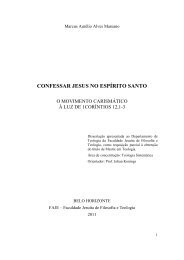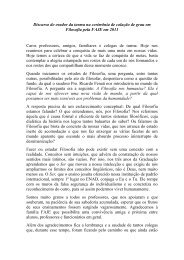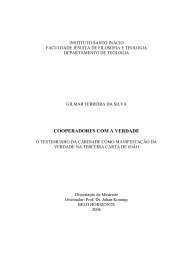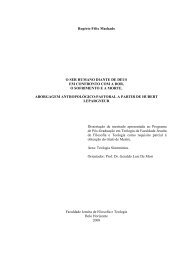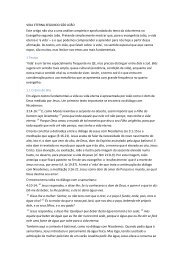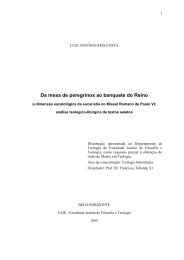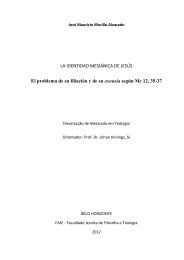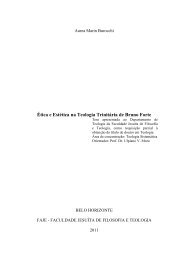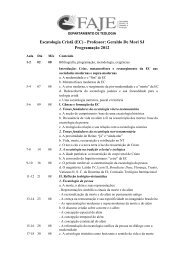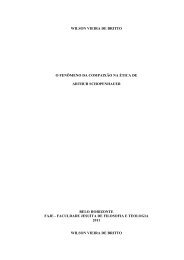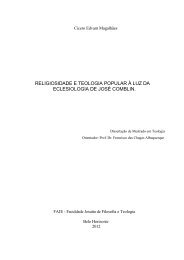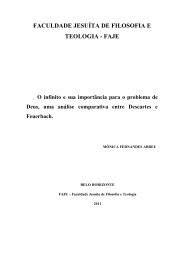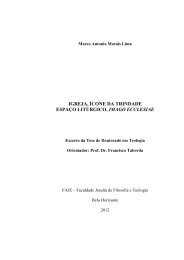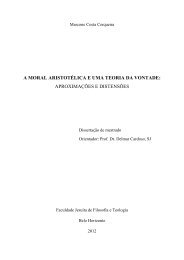o teÃsmo e o problema do mal em richard swinburne - FaJe
o teÃsmo e o problema do mal em richard swinburne - FaJe
o teÃsmo e o problema do mal em richard swinburne - FaJe
Create successful ePaper yourself
Turn your PDF publications into a flip-book with our unique Google optimized e-Paper software.
d<strong>em</strong>asia<strong>do</strong> sofrimento a d<strong>em</strong>asiadas pessoas (e animais) com o<br />
propósito de tornar possível que tenham uma escolha livre e que isso<br />
faça grande diferença para elas e para o mun<strong>do</strong>, ten<strong>do</strong> como base o<br />
conhecimento obti<strong>do</strong> pela investigação racional. Nenhum Deus<br />
deveria ter permiti<strong>do</strong> Hiroshima, o holocausto, o terr<strong>em</strong>oto de Lisboa,<br />
ou a peste negra, afirma o opositor. Com a objeção que, se há um<br />
Deus, ele t<strong>em</strong> exagera<strong>do</strong>, eu sinto inicialmente uma simpatia<br />
considerável. A objeção parece importante contra a afirmação de<br />
que há um Deus. 76<br />
V<strong>em</strong>os que ele admite que há muito <strong>mal</strong> no mun<strong>do</strong>, e mesmo que seja<br />
para se atingir algum b<strong>em</strong>, há coisas que nos chocam e não pod<strong>em</strong>os<br />
simplesmente minimizá-las. Os ex<strong>em</strong>plos cita<strong>do</strong>s indicam que, como busca<br />
afirmar sua hipótese <strong>em</strong> bases racionais, ele não deve ignorar os aparentes<br />
contra-sensos. Por isso ele se propõe a buscar uma solução que se enquadre<br />
na sua linha de argumentação.<br />
A solução que apresenta se apóia na consideração que to<strong>do</strong> esse<br />
sofrimento pode ser permiti<strong>do</strong> se houver alguma compensação. A<br />
compensação que no caso Deus oferece se dá por duas vias. A primeira é que,<br />
segun<strong>do</strong> a <strong>do</strong>utrina cristã da encarnação, Deus se faz solidário no sofrimento<br />
da criação e isso serve para incentivar os homens a suportar<strong>em</strong> a <strong>do</strong>r e o<br />
sofrimento. A segunda é que Deus oferece uma vida após a morte que<br />
compensará aquele indivíduo que, no balanço das oportunidades, tenha ti<strong>do</strong><br />
mais prejuízos <strong>do</strong> que benefícios na vida presente.<br />
Essa solução acrescenta hipóteses complexas a uma hipótese que até<br />
então pretendia ser simples, mesmo <strong>em</strong> seu conjunto. Por isso, Swinburne faz<br />
uma avaliação para justificar que o <strong>mal</strong>, <strong>em</strong>bora seja um contra-argumento,<br />
não é suficiente para desarticular o conjunto que representa a hipótese teísta.<br />
Ele apresenta esse balanço nos seguintes termos:<br />
76 “There is too much evil that humans can <strong>do</strong> to their fellows, and too many and too unpleasant<br />
natural evils to subserve the good of the opportunities for sympathetic and courageous<br />
response and for rational inference and inquiry that they give to humans. The suffering of<br />
children and ani<strong>mal</strong>s is something that rightly often appals us. This is, I believe, the crux of the<br />
probl<strong>em</strong> of evil. It is not the fact of evil or the kinds of evil that are the real threat to theism: it is<br />
the quantity of evil—both the number of people (and ani<strong>mal</strong>s) who suffer and the amount that<br />
they suffer. If there is a God, the objector says in effect he has given humans too much choice.<br />
He has inflicted too much suffering on too many people (and ani<strong>mal</strong>s) for the purpose of making<br />
it possible for th<strong>em</strong> to have a free choice and to make greatly significant differences to<br />
th<strong>em</strong>selves, each other, and the world on the basis of knowledge obtained by rational inquiry.<br />
No God ought to have allowed Hiroshima, the Holocaust, the Lisbon Earthquake, or the Black<br />
Death, claims the objector. With the objection that, if there is a God, he has over<strong>do</strong>ne it, I feel<br />
considerable initial sympathy. The objection se<strong>em</strong>s to count against the claim that there is a<br />
God.” (SWINBURNE,R. The Existence of God. Second edition. 2004, p.263).<br />
89



